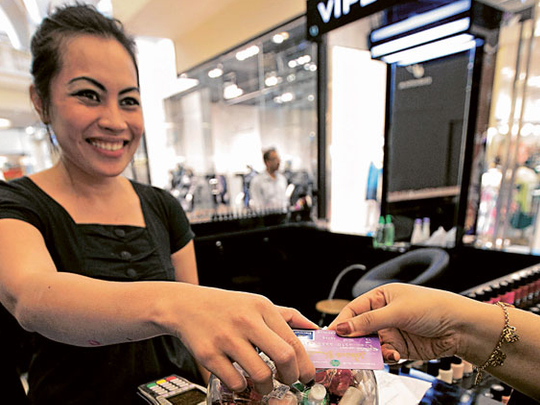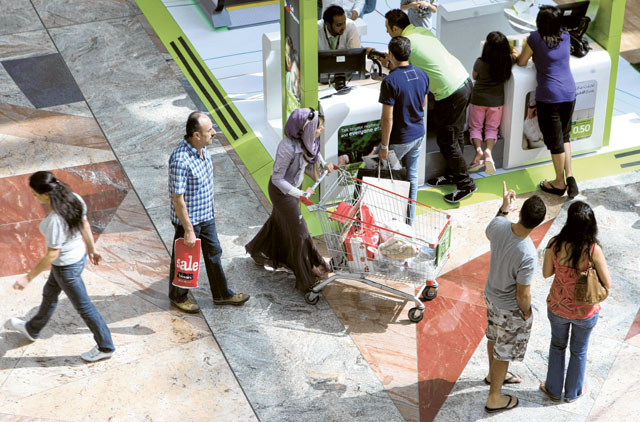
Dubai: Plastic, it seems, can never go out of fashion. At least where consumer spending options are concerned.
In the UAE, consumers are now starting to use cards — credit, debit or whatever other persuasion is out there — much more frequently than was the case in 2009 and in the early part of last year. For card issuers and the services industry in general, there's even more reason for cheer as the average spend per transaction has also shown marked improvement in recent months.
But that's not the same as saying that UAE consumers are ready to forget some of the bitter lessons brought on by the recession.
"In the majority of cases, what consumers spend using credit cards are being paid back to the issuing bank either in full or close to it at the first billing itself," said Sundar Parthasarathy, head of consumer assets at Abu Dhabi Commercial Bank.
"So, the revolving credit — the balance on which credit is charged for each card-related transaction by the issuing bank — is still very much on the lower side. Cardholders continue to be extremely prudent and issuing banks are in complete sync with such a sentiment."
Another trend that's becoming more noticeable in recent weeks — on print and the air waves — is that banks are becoming more lenient about issuing cards. Co-branding opportunities are being explored more intently, be it with a hypermarket operator, airline or even cinemas.
"There has been no easing up on the credential requirements that cardholders must adhere to," said Parthasarathy. "What's happening is that with a general improvement in market sentiments and consumer confidence, card issuance is moving to normal levels.
"In such a scenario, co-branding allows the bank to leverage the point-of-exposure opportunities to its fullest. When you have an alliance with a hypermarket operator, this is mirrored in each of their outlets, much more than what could be achieved on one's own. It's a win-win for both [parties]."
Random poll
The gradual turnaround of the economy has had a significant say in the improved card usage in the market. A random poll at some of the mid- and premium-priced retailers at a leading local mall indicated that card usage was definitely on the mend and, more importantly for them, achieving a higher average value per transaction.
"The number of buyers wanting to acquire a Dh25,000 watch may not be that many, but we can say that people looking to spend Dh4,000 to Dh10,000 on a watch are there in enough numbers to keep us busy," said a luxury retailer.
According to Rasool Hujair, CEO of Majid Al Futtaim-JCB Finance and the issuer of the hugely popular Najm cards: "The last two quarters were extremely good for us. The take-up of Najm cards is over 300 per cent above our target.
"This was achieved without making any changes in the account opening requirements. This achievement was mainly benefits -driven, as more customers seek to take advantage of the relevant features of our products."
The company does not have any association with banks on the Najm cards, but, "as we grow there may come a point where an alliance could help us to expand the company services further".
"Our current focus is to solidify our position as a major credit card issuer in the country and expand our gift card business in which we are a market innovator and leader," Hujair said. "In [the] coming months we plan to further expand the pre-paid services to include payroll, incentive and travel cards."
According to data from MasterCard Worldwide, at the end of the first three quarters of last year, the registered growth in gross dollar volume in the Asia-Pacific, Middle East and Africa territory was up 17.5 per cent compared with the corresponding period in 2009. So were purchase volumes and transactions, by 15.7 per cent and 14.8 per cent respectively.
Cards issues rose 10.2 per cent and cash transactions by 28.3 per cent. Even with all the headline numbers pointing north, a top regional official at MasterCard Worldwide said the abiding theme of consumers was one of caution.
"While the economy is in a recovery phase, we feel consumers will continue to remain cautious regarding their spending patterns and manage their finances with payment cards, and look to benefit from the rewards and privileges that various card programmes offer," Eyad Al Kourdi, vice-president and country manager for the UAE, said. "Credit card skips were a significant issue in the UAE at the peak of the economic downturn, as jobless expatriates left the market leaving debts unpaid. The percentage of defaults, however, has tumbled in the last year... And, as many consumers shifted their spending away from discretionary to non-discretionary expenses, they were increasingly choosing our payment cards and products as tools to better manage their finances."
Transactions
The interest on card-related transactions have gone through a few tweaks in the last year and more, but geared towards the higher side. How has this played out in determining consumer behaviour?
"The difficult economic environment in the last two years led to a rise in the level of risk which in turn has led to a small increase in interest charges," said Hujair. "This is not something unique to the UAE, all the card issuers across the globe have faced the same issues.
"At Majid Al Futtaim Finance, we aim to provide a competitive standard interest rate and also provide customers with an easy payment plan for large purchases, which has a significantly lower interest rate. This plan has proven to be very popular."
Since Najm Visa's launch in July last year, the bulk of the purchases were at the supermarkets, making up to 57 per cent of the cardholder's monthly spend.
Between July and September, the UAE's shoppers' spending on consumer electronics saw a 20 per cent surge, while those on home furnishings and jewellery/watches were up 10 per cent.
But categories such as spending on fashion, books and music, and eating out suffered "slight" declines, according to Majid Al Futtaim Finance.
Promotion and offers
There may be more campaigns and cold calls featuring credit card offers, but that need not immediately translate into new cards in your wallet.
"A mere application does not guarantee acceptance — creditworthiness of consumers is now being more carefully assessed and, perhaps more importantly, credit limit is also more regulated as compared to the past with lower limits being the norm," said Akash Pal, regional executive director for consumer research at The Nielsen Co. Pal said a survey early last year showed more than a third of consumers claiming to use credit cards less often.
A year down the line and with consumers generally striking more optimistic notes, it could be that their sentiments in the cards versus cash debate would also change.













